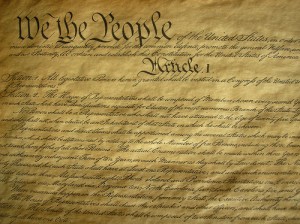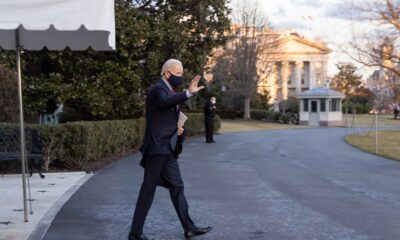Constitution
Detention law and the Constitution

The new “detention law” that passed the Senate on Thursday has many wondering whether the Constitution still protects Americans from abuse of power.
Text of the detention law
The “detention law” is part of the National Defense Authorization Act of 2011. Congress must pass such a law every two years. The Constitution (Article I, Section 8, Clause 12) says:
The Congress shall have the power…to raise and support armies, but no appropriation of money for that use shall be for a longer term than two years.
Hence the biennial NDAA. It re-authorizes the Army and several other army-like uniformed services, as the Constitution says it must. (The Constitution allows Congress to authorize the Navy indefinitely.)
Normally the NDAA does not provoke controversy. But this year it does. Subtitle D, “Detainee Matters,” is the law at issue. Sections 1031 and 1032 specifically authorize the President to detain indefinitely any person suspected of:
- Having carried out, or helped carry out, the attacks on the World Trade Center, the Pentagon, and arguably another target or targets in Washington, DC on September 11, 2001, or:
- Being a member of al-Qaeda (“The Base”), the Taliban, or other groups having anything to do with them.
Indeed, the bill requires the President to detain any foreign national in a military prison, like a stockade or a brig, if US forces or police catch that foreign national plotting or carrying out an attack against the United States, or being a member of the above-named terrorist groups. If the suspect is an American citizen, the law does not require the President to hold him in a military prison, but still allows him to.
Alarms about the detention law

The US Constitution. (Does the new detention law violate it?) Photo: National Archives of the United States
Senator Rand Paul (R-KY), Judge Andrew Napolitano, anti-war activist Paul Joseph Watson, and OathKeepers leader Stewart Rhodes all have raised alarms about the detention law. The problems:
- This new law suggests that the war against al-Qaeda, the Taliban, and “associated forces” will have no end.
- The detention law leaves the decision as to who is, and who is not, a proper terrorist suspect up to the President, as Commander-in-Chief of the armed forces. The detention law provides for no judicial review. It does not even allow a suspect to demand trial by court-martial, military tribunal, or the like. It says only that the “law of war” shall apply to his case.
- In theory, the President could accuse any American citizen of membership in al-Qaeda, etc., and order, say, the Military Police to arrest him, ship him down to Camp Delta in Guantanamo Bay, and keep him there indefinitely.
With regard to that last, Paul Joseph Watson and Alex Jones are not satisfied with the language in Section 1302 that seems to forbid the military to detain an American. That section removes the requirement for military custody. It does not remove any authority for the military to detain an American.
Congress has authorized the use of force against those who carried out the September 11 attacks, had a hand in them, or harbored anyone who did. It has never rescinded that authority. Whether Congress properly declared war against such persons by that instrument, or even can declare war against any entity other than a nation-state, is in dispute. From the Constitution, Article I, Section 8, Clause 11:
The Congress shall have the power to declare war, grant letters of marque and reprisal, and make rules concerning capture on land and water.
Technically, the detention law is a capture rule within the meaning of that text. Also, Article III, Section 3 reads:
Treason against the United States, shall consist only in levying War against them, or in adhering to their Enemies, giving them Aid and Comfort. No Person shall be convicted of Treason unless on the Testimony of two Witnesses to the same overt Act, or on Confession in open Court.
The Congress shall have power to declare the Punishment of Treason, but no Attainder of Treason shall work Corruption of Blood, or Forfeiture except during the Life of the Person attainted.
According to this, the Constitution does contemplate an individual making war against his own country. So Congress may declare war against an individual, or a group other than a nation-state. Whether it properly did so when it authorized force against al-Qaeda, the Taliban, and associated forces, is an open question.
Senator Paul reminded the Senate that US law-enforcement officers arrested one José Padilla, an American citizen, charged him with “providing material assistance” to terrorists, and brought him to trial. There a jury convicted him. (“Material assistance” qualifies as “aid and comfort to an enemy,” a form of treason that the Constitution defines. See above.) Paul further said that nothing in then-current law would have forbidden those having advance warning of the 9/11 attacks to pass or act on that warning. If they did not, that was their error, to put it mildly. Nor does the Senator believe that bringing people to trial has ever made spying on real terrorists any harder. (Arguably, it wouldn’t. Any terrorist leader would change his communications and methods as soon as American or allied forces captured one of his men. Elementary war-games theory would predict this. Thus the “intelligence channels” would be obsolete anyway. So why not bring such a person to trial?)
Senator Paul also warns that the definition of “member of al-Qaeda or the Taliban” is too vague. Furthermore, it goes beyond the original authorization of force. That authorization said nothing about membership, but only about who destroyed the World Trade Center and tried to destroy the Pentagon.
Judge Andrew Napolitano, in a video embedded below, asks several chilling hypothetical questions. What if, in sum, the government blew an external threat out of all proportion to how serious it really was, just to have an excuse to arrest people on a whim?
Andrew G. Martin at examiner.com raises another issue: this law compromises the Posse Comitatus Act. By that Act, the US military does not enforce civilian law in US territory. Under the new detention law, it will.
Some of these activists, to be sure, doubt that the threat from al-Qaeda or the Taliban ever was, or is now, as serious as the government usually says. That aside, the government seems to have forgotten that the ordinary citizen and lawful resident, armed and able to defend himself and others around him, was the first line of defense against out-of-control criminals until the beginning of the twentieth century. All the government need do is repeal all gun-control laws and let the citizens arm themselves. That it has never done so, itself casts legitimate doubt on what the government really means to do with its powers.
Terry A. Hurlbut has been a student of politics, philosophy, and science for more than 35 years. He is a graduate of Yale College and has served as a physician-level laboratory administrator in a 250-bed community hospital. He also is a serious student of the Bible, is conversant in its two primary original languages, and has followed the creation-science movement closely since 1993.
-

 Executive4 days ago
Executive4 days agoSecret Service chief gets no solace
-

 Executive3 days ago
Executive3 days agoWaste of the Day: Louisville Taxpayers Pay Nearly $600,000 For Empty Building’s Maintenance, Security
-

 Guest Columns4 days ago
Guest Columns4 days agoFear Itself: Democrats’ Favorite Strategy Caused Their Current Chaos
-

 Executive3 days ago
Executive3 days agoWhere is Joe Biden – or Jill?
-

 Executive1 day ago
Executive1 day agoWaste of the Day: Throwback Thursday: Cities Used Crime Prevention Funds on Soccer Games, Paper Shredding
-

 Executive2 days ago
Executive2 days agoFacile and politically motivated suggestions
-

 Civilization5 days ago
Civilization5 days agoBuild Iron Dome in the United States To Prepare for Israel’s Worst Day
-

 Executive4 days ago
Executive4 days agoThe Emerging GOP Plan To Beat Kamala Harris















We sure could have used the Tea Party for the Patriot Act.
Of course, once a Democrat is no longer in office, I can’t help but think that the Republican party line will shift from small government to national security.
Then we’ll see what becomes of the Tea Party.
Perhaps they’ll persist, perhaps their backers will want a piece of the military-industrial pie.
Politics makes me cynical…
[…] Detention law and the Constitution […]